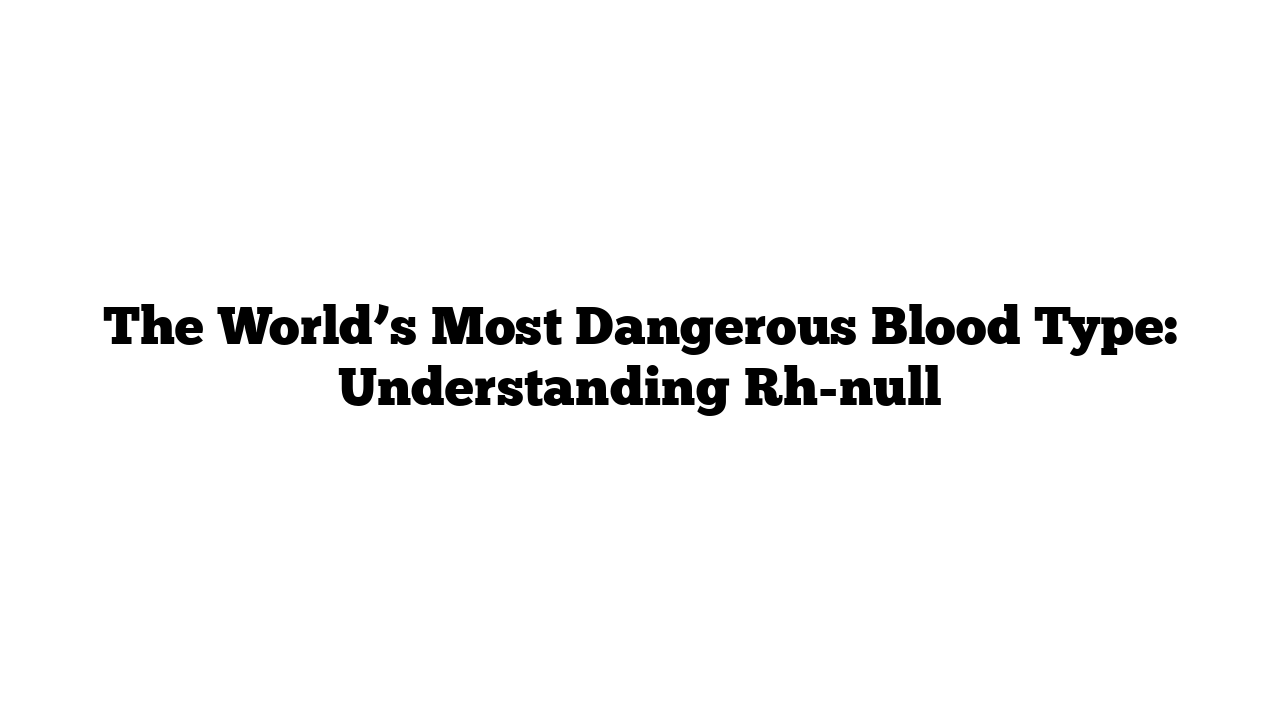Blood donation is a crucial aspect of healthcare, with nearly 5 million Americans needing blood transfusions each year. This life-saving procedure often makes the difference between life and death, especially for patients undergoing surgery or dealing with traumatic injuries. Every day, 32,000 pints of blood are required in the USA alone. While most of us are aware of the importance of donating blood, few realize that our individual blood types can significantly impact medical care.
The Rarity of Rh-null Blood
Imagine having a blood type so rare that your life could be in danger if you suffered an injury. This is the reality for those with Rh-null blood, the rarest blood type globally, found in only 43 known individuals. For people with Rh-null, a typical injury that would be treatable for others could be fatal due to the lack of compatible blood donors.
Understanding Blood Types
Most people are familiar with the basic blood types: O+, A+, B+, AB+, and their negative counterparts. These classifications stem from the ABO system, which is based on specific antigens present on the surface of red blood cells. Antigens are like markers that help our immune system differentiate between our body’s cells and foreign invaders.
- Type A: Has A antigens and anti-B antibodies.
- Type B: Contains B antigens and anti-A antibodies.
- Type AB: Possesses both A and B antigens, with no antibodies against them, making it a universal recipient.
- Type O: Lacks both antigens but has anti-A and anti-B antibodies, making it a universal donor.
The Rh Factor
In addition to the ABO system, blood is also classified by the Rhesus (Rh) system, which includes the important D antigen. If this antigen is present, the blood type is positive (e.g., A+), and if it’s absent, it’s negative (e.g., A-). People with Rh-negative blood can only receive blood from other Rh-negative donors, which adds another layer of complexity.
The Unique Case of Rh-null Blood
Rh-null blood is so named because it lacks all 61 antigens in the Rh system. This extreme rarity poses significant challenges. Individuals with this blood type can only receive blood from the other 42 known Rh-null individuals, making transfusions exceedingly complicated. Even in emergency situations, finding compatible blood can be a logistical nightmare due to bureaucratic regulations and the strict rules surrounding blood importation in various countries.
For example, one Swiss man with Rh-null blood recounts his childhood experiences where he couldn’t participate in summer camp activities due to the risk of injury. Now as an adult, he limits his travel to places with modern medical facilities, fearing the need for a blood transfusion. His solution? He regularly donates blood to himself to ensure he has a reserve in case of emergencies.
The Burden of Being a Rare Blood Type
While those with Rh-null blood have the ability to donate to anyone with Rh-negative blood types, this responsibility can feel overwhelming. Imagine receiving a call to donate urgently for a newborn in need—this can mean scrambling to reach a donation center, often at personal expense. The ethical dilemma here is profound: when does the obligation to help others become too much to bear?
The Importance of Blood Donation
The history of blood transfusions stretches back to the 1800s and has saved countless lives in both peacetime and wartime. During World War II, for instance, the American Red Cross transported nearly 200,000 pints of blood to support Allied forces, showcasing the critical role that blood donation plays in healthcare.
As we reflect on the importance of blood types and donations, it’s essential to recognize that hospitals depend on voluntary donors to provide life-saving blood. Each donation can make a significant difference in someone’s life, regardless of blood type.
A Call to Action
If you haven’t yet donated blood, consider making an appointment. Your contribution could save a life, especially in emergency situations where compatible blood is needed urgently. To learn more about blood donation and its impact on healthcare, visit medicaltimes.io.
